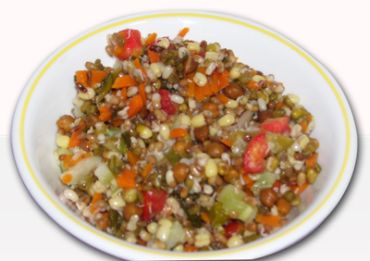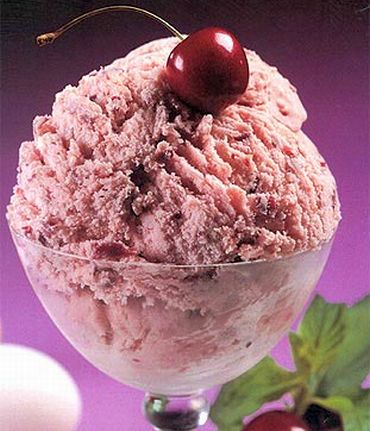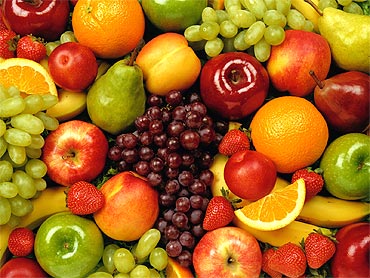 | « Back to article | Print this article |
Five ways to lose weight without starving
India is the second largest 'obese' nation in the world with 155 million overweight people, second only to China. Experts believe that by the year 2020, we shall easily topple China in this dubious distinction.
Obesity is usually a result of overeating or unhealthy eating habits and sedentary habits. But eating less may cause nutritional deficiencies and health consequences. Careful selection of the right foods and eating smaller meals may help you lose weight better.
Here then, are ways to feel satiated without starving yourself:
Eat more protein
During digestion, proteins often burn more calories (or energy) than they contribute to the body. This extra energy comes from fats stored in tissues.
Consuming large amounts of proteins (a gram for every pound of lean body mass) thus effectively burns excess fat. After every meal therefore your metabolic rate will peak as energy is used up to process your meal. This is called the thermic effect of food and proteins have a higher thermic effect than dietary fat which is more easily digested.
Moreover, a diet high in protein diet will increase lean body mass, which will in turn, increase your metabolism, leading to higher calorie expenditure.
You can start your day with a bowl of oat porridge, with fruit slices to make it more enticing. Later you can have sprouts; you can create a salad with sprouts, yogurt and a dash of lemon. You can also eat whole wheat bread, rotis fortified with soya bean flour without refined flour (maida) some dal (with little less tadka) and rice. You can also include low fat milk and in your diet.
Reviewed by Venu Hirani, nutritionist, fitness consultant and proprietor of Bodyworks -- Weight Management Specialists, Mumbai.
Eat calorie-low foods
Calorie-dense foods are rich foods that have more calories per gram than those that are less calorie-dense. Water in foods increases the volume of foods without increasing the calorie content.
Studies show that eating a diet of less calorie-dense food can help people consume lesser calories while still feeling satisfied.
Eat lots fruits and use water-rich vegetables to prepare your meals. You may combine them with some cheese, soya bean or lean meat. This way, your meals will not only be sufficiently filling but also contribute fewer calories.
A bowl of soup or fresh salad at the start of a meal will also ensure that you consume less of the meal that follows.
Eat healthy carbs
Carbohydrates are large, complex molecules made up glucose, the simplest sugar. Inside our body, they release this glucose, which provides the body with carbon and energy.
They also stimulate the production of a hormone called serotonin, which shuts off appetite. Good carbs also contain fiber which is necessary for digestion.
To get more good carbs and fiber, choose whole grain foods over those made from refined (white) flour. Vegetables, legumes and fruits are also rich sources of good carbs with good nutrients.
Avoid bad carbs like soft drinks, snacks such as cookies and chips, and alcohol.
Go low on fat
Fats are essential to give our dishes the rich flavor and taste we hunger for. But excess fat can raise LDL cholesterol levels, implicated in many heart diseases.
Saturated fats found in meat and dairy products are a no-no since they are high in their energy content and pack more calories per unit weight than the unsaturated varieties.
Don't give up on fat entirely as fats are our source of fat soluble vitamins A, D, E and K. However, source your fat intake from healthy sources such as sunflower oil, safflower, rice bran and olive oil.
Also restrict the amount you have to not more than 3 teaspoons per day. You'll find that dishes made with less oil are equally tasty.
Snack healthy
Satisfy hunger pangs between meals with healthy snacks such as oatmeal, fruits, or salads made from vegetables such as spinach and celery, cucumber, tomato, cabbage and capsicum.
Oatmeal is a complex carbohydrate that is rich in dietary fiber. It takes longer to digest and also contributes to a feeling of fullness.
If you are non-vegetarian, you can eat fish such as salmon, tuna, mackerels, herring and sardines which have omega 3 fatty acids and are good for the heart.
Citrus fruits (sweet lime, grapefruit, and lemon) and papaya which are rich in vitamin C, also help the body process fat faster. Popcorn (without the butter), is rich in fiber and takes longer to eat making you feel more sated.
Finally, consult your doctor if you experience frequent mood swings. Depression, work stress and personal problems can influence eating habits of people, causing them to eat more carbohydrate rich foods.
Emotionally unstable people tend to overeat just to feel good, which leads to obesity which in turn may result in lack of self esteem and depression as well.





